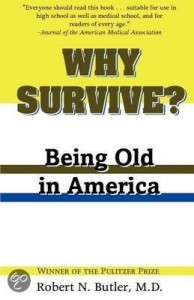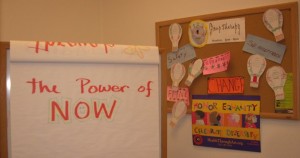E-News Article
 |
Community Currents
San Francisco Central City Older Adults – Interview with Milfe Ramos, Ed.D. By PWDF Staff In the Pulitzer Prize-winning book, Why Survive? Being Old in America (1975), the late geropsychiatrist Robert N. Butler wrote about how ageism prevented health professionals from effectively addressing the unique mental health needs of the elderly. For example, he found that health professionals tended to write-off older adults as untreatable based on age or “senility,” viewing them as cantankerous and complaining patients who were time-consuming (with their longer history, complicated symptoms, garrulousness), and failing to recognize sensory impairments that could contribute to mental symptoms (anxiety, depression, suspiciousness).
Dr. Butler also noted since the 1950s, psychoactive drugs like tranquilizers and antidepressants became widely used in the care of older patients suffering from agitation, anxiety and depression—by dulling feeling, “an all too easy answer for the many complicated physical and emotional reactions of late life” (p. 198) than engaging in the longer process of talk therapy to help them through a crisis. However, Dr. Butler observed that the side effects of many drugs tend to reinforce slowing-down responses, which the elderly may misinterpret as failing health and dying. Dr. Butler found group therapy in late life particularly effective, helping to overcome loneliness by sharing common concerns. Fast forward 40 years after publication of Why Survive?, the prevalence rates of mental illness and substance abuse appear to be higher among America’s baby boomer cohort than previous generations of elders. Nearly 20% of American older adults have mental health and substance use conditions. 1 According to the Centers for Disease Control and Prevention, in 2013, the highest suicide rate (19.7 per 100,000) was among people 45 to 54 years old, and the second highest suicide rate (18.6 per 100,000) was among those 85 years and older. 2 Curious about local community mental health services for older adults, PWDF staff paid a visit to Central City Older Adults (CCOA), a geriatric mental health clinic a few blocks away from People With Disabilities Foundation’s office, for a tour and engaging interview with staff psychiatric health worker Milfe Ramos, Ed.D. Conveniently located on a street level office space at 90 Van Ness Avenue, CCOA’s nondescript name is welcoming and accessible to older adults who might shy away from a space called “mental health clinic,” due to stigma. According to Milfe, elderly clients with Medi-Cal or Medicare can access services at this outpatient psychiatric clinic, which is open Monday to Friday, 8:30 am to 5 pm, telephone (415) 558-5900; staff also make visits to clients’ homes, shelters, adult day health care centers, hospitals, etc. Community care is only effective if people use services, so CCOA staff tries to meet clients where they are. When was CCOA founded? What services are provided? Who’s on staff? CCOA was founded in the early 1980s, and originally named Older Adult Consultation Services, and later became Central City Older Adults Clinic. It is part of San Francisco Department of Public Health’s Community Behavioral Health Services (CBHS). 3 Services include psychiatric evaluation, medication management, crisis intervention, dual diagnosis treatment, schizophrenia support group facilitation, case management and referrals. Our staff comprises two social workers [including Milfe, who is fluent in Tagalog and two other Filipino dialects]; two nurses (including one who is fluent in Cantonese/Mandarin); and one part-time psychiatrist. We are expecting to hire soon two additional Spanish-speaking social workers, senior clerk, and a program manager. Who is eligible for CCOA’s services? How do people find out about CCOA? We primarily serve adults who are age 60 years or older, and who reside in the Civic Center, South of Market and Tenderloin districts. We get referrals from clients, hospitals, hotels, county access (#255-3400), Homeless Outreach Team (HOT), Mayor’s Office of Housing, etc. Since I’m the only Tagalog-speaking clinician in the geriatric sector, Filipinos who live outside our district can be seen here as long as they are able to come to the clinic. How many clients did you serve in the past year? Who actually uses CCOA’s services? What are your client demographics? Based on our most recent reporting data available as of the quarter ended March 31, 2015, we served 241 unduplicated clients with the following demographics: Age: range from age 60 to 94, with a handful of clients who are younger than 60. Sex: 54% are female, 46% are male. Race/ethnicity: 45% White, 17% Chinese, 14% Black, 10% Filipino, 6% Hispanic/Latino. Remaining 8% represent other Asian, Asian Indian, other European, Hawaiian, Japanese, Laotian, other Middle Eastern, Native American, Russian, Samoan, and Other unspecified. Marital status: 33% not married, 25% divorced, 18% widowed, 11% married, 3% separated. Remaining are unknown. Primary language: 56% English, 14% Cantonese, 7% Spanish, 6% Tagalog. Other languages include other Filipino dialects, German, Italian, Japanese, Mandarin, Russian, and other non-English. What is the cost for CCOA’s services? We primarily serve clients with Medi-Cal, Medicare, or no insurance. We also have sliding scale fees for those with share-of-cost Medi-Cal. What mental health issues are specific to older adults that are different from other age groups? Before coming to CCOA, I worked at South of Market Mental Health Clinic, which serves younger adults with mental illness/substance abuse problems. At CCOA, we also must consider older adults’ physical health conditions, such as diabetes, hypertension, kidney problems, chronic pain, which all affect their mental state—in addition to substance abuse. Substance abuse includes tobacco/nicotine/alcohol dependence, and street drugs like cocaine/crack/marijuana, that can negatively impact cognitive and heart health. Since many older adults have chronic physical problems, in addition to mental problems, we take a holistic approach in coordinating with primary care. We refer and sometimes escort clients to Curry Senior Center, a primary health care clinic in the Tenderloin. We also have a nurse from Curry who comes to CCOA twice a month for clients who are otherwise too psychiatrically disabled to visit Curry for their regular medical visits.  Milfe Ramos, Ed.D. Milfe educates clients, especially from the “flower generation” who have a benign view of drugs, by showing graphic SPECT images of “holes” in brains linked to substance abuse (tobacco, cocaine, methamphetamine, alcohol, heroin and marijuana). What are the most common mental disabilities experienced by older adults at CCOA? What are the most challenging mental disabilities, and why? Based on my 68 clients, their most common mental disorders are depression, anxiety, and schizophrenia – often co-occurring with substance abuse (alcohol, pain medications, cocaine, crack) and multiple chronic medical conditions. The most challenging are clients with paranoid-schizophrenia or bipolar disorder because they have no insight into their illness or treatment needs, so we focus on their symptoms, like difficulty sleeping. They are unable to care for themselves and refuse medications, so we have some clients who come here daily or once a week as part of their medication regimen and for their case management needs. We also collaborate with the Public Guardian’s Office in helping clients manage their monthly allowance. Clients usually spend this allowance on meals and cigarettes. We never recommend smoking, but we use the harm reduction model. Some clients are too paranoid to stay in shelters, so we work with HOT to get clients stabilized in hotels or residential treatment sites, which are better than living on streets outdoors. What interventions are available to address these common/challenging mental disabilities? One-on-one counseling is an effective intervention for younger seniors who have trauma; however, counseling is less effective for older adults with cognitive problems. For clients who have schizophrenia, generalized anxiety or bipolar disorder, the focus is symptom management through medication management. I facilitate a weekly support group for clients with schizophrenia. This is a closed group, and we provide snacks and discuss different topics. It has been effective because more than half of this group signed up for smoking cessation and no longer have substance abuse problems.
Many clients lack social support—they have outlived family members or are estranged from family due to their mental illness/substance abuse. Sometimes, we are able to help clients re-establish connections with family, and I am assisting one client with dementia so she can be reunited with her family in the Philippines. We also work to connect clients to In-Home Supportive Services, money management services, and socialization groups to participate in community programs like Canon Kip Senior Center, The Salvation Army Kroc Center, San Francisco Senior Center and Stepping Stone Adult Day Health Care. How do you address potential barriers to providing mental health care to older adults? We try to be welcoming and address stigma. For example, when I work with older Filipino clients, they do not want to hear stigma of “mental illness,” so I will use language like “nervous” or “sad” instead of anxiety, and “worried” instead of insomnia.
PWDF ProfileWho We ArePeople With Disabilities Foundation is an operating 501(c)(3) nonprofit organization based in San Francisco, California, which focuses on the rights of the mentally and developmentally disabled. ServicesAdvocacy: PWDF advocates for Social Security claimant’s disability benefits in eight Bay Area counties. We also provide services in disability rights, on issues regarding returning to work, and in ADA consultations, including areas of employment, health care, and education, among others. There is representation before all levels of federal court and Administrative Law Judges. No one is declined due to their inability to pay, and we offer a sliding scale for attorney’s fees. Education/Public Awareness: To help eliminate the stigma against people with mental disabilities in society, PWDF’s educational program organizes workshops and public seminars, provides guest speakers with backgrounds in mental health, and produces educational materials such as videos. Continuing Education Provider: State Bar of California MCLE, California Board of Behavioral Sciences Continuing Education, and Commission of Rehabilitation Counselor Certification. |
Volume 24Winter 2016© People With Disabilities Foundation 507 Polk Street Suite 430 [Clicking on the links below will take you out of the newsletter.] (415) 931-3070 Oakland Office Support Us: |
|
Our Mission is to provide education and advocacy for people with psychiatric and/or developmental disabilities, with or without physical disabilities, so that they can achieve equal opportunities in all aspects of life. |
|
|
PWDF does not provide legal assistance by email or telephone. Unsubscribe from this e-newsletter list. |
- Institute of Medicine, The Mental Health and Substance Use Workforce for Older Adults: In Whose Hands? p.1 The National Academies Press, 2012. ↩
- U.S. Department of Health and Human Services, Centers for Disease Control and Prevention, National Center for Health Statistics, National Vital Statistics Reports, Vol. 64, No. 2, p. 35 (February 16, 2016). ↩
- San Francisco Department of Public Health, Community Behavioral Health Services, https://www.sfdph.org/dph/comupg/oservices/mentalHlth/CBHS/. ↩


